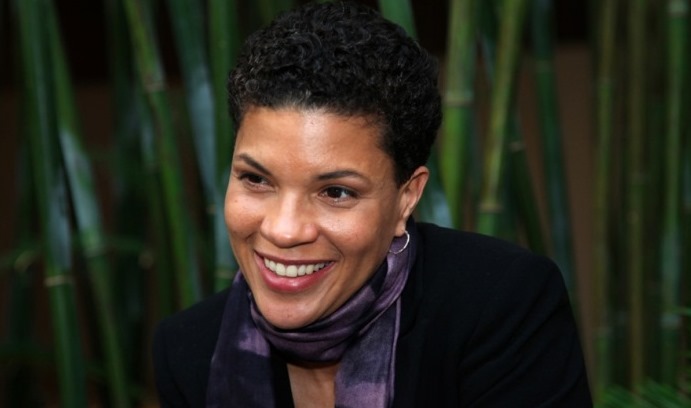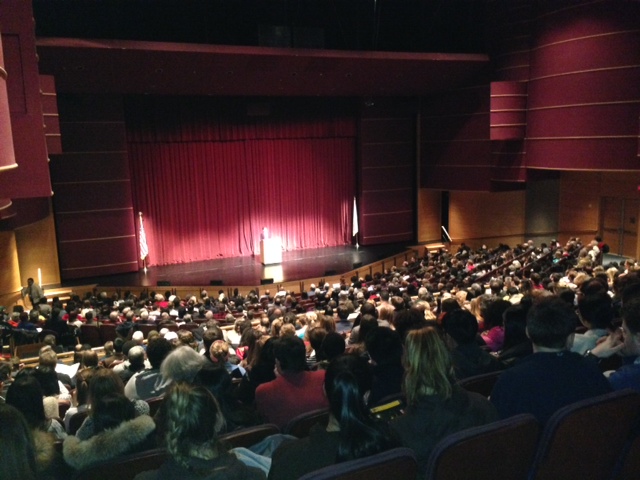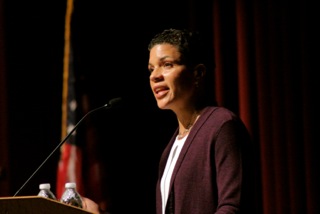"Pull back the curtain and tell the truth"

Michelle Alexander, keynote speaker for Lehigh’s celebration of the life of the Rev. Dr. Martin Luther King Jr., said more black Americans have been incarcerated than the number of black people enslaved in America before the Civil War.
More than 600 people packed Baker Hall Wednesday night to hear award-winning activist Michelle Alexander deliver the keynote address for Lehigh’s year-long celebration of the life of the late civil rights leader the Rev. Dr. Martin Luther King Jr.
Alexander, the author of the best-selling The New Jim Crow: Mass Incarceration in the Age of Colorblindness, focused on the impact of institutionalized racism through mass incarceration of people of color.
Throughout her hour-long talk, Alexander drew on the research outlined in her book to argue America is far from a post-racial society and that racist beliefs, policies and practices are thriving in the 21st century. A primary contributor is a legal system that criminalizes and warehouses young African-American men in extraordinary numbers, forever altering the trajectory of their lives.
“Today, a prison industrial complex unprecedented in our history is so violent, so brutal, so unrelenting, that most people couldn’t even conceive of it,” said Alexander, who also noted the futility of fighting it. “Once that system sets its sights on you, it’s nearly impossible to control.”
The prison population has more than quintupled since the 1970s, when the war on drugs—“and I mean a literal war”—began in earnest. She compared the 350,000 who were incarcerated in 1970s to the more than 2 million today—a higher rate of incarceration than any other country.
“What I’m saying must sound extreme to some….but the truth is that more African-Americans have been incarcerated today than African-Americans were enslaved,” she said. “The truth is that we are the most punitive nation in the world.”
Alexander received a standing ovation after her speech and then fielded questions from members of the audience on the prison industrial complex, police practices, poverty and activism.
New forms of disenfranchisement
Although some may point to the election of the first African-American president as evidence of a post-racial America, Alexander argues that we must not “look up, to the top of the pyramid, but to the bottom. We must confront the inconvenient truth: we’ve birthed a new Jim Crow.”
The days of polls taxes and literacy tests may be long-gone, she said, but a new form of disenfranchisement of people of color is emerging through voter suppression tactics that are being widely adopted throughout the country.
“These tactics are accomplishing what a poll tax could not,” she said. “So many old forms of discrimination supposedly left behind are legal again.”
Many American, she said, were shocked to see the events in Ferguson, Mo., when Michael Brown, an unarmed young African-American man, was shot and killed by a police officer, and local authorities dispatched heavily armed SWAT teams to control the protests that took place in the ensuing days.
“It’s not just on the streets of Ferguson,” she said. “Since the drug war was declared, the Pentagon began sending military equipment to your home town, and SWAT teams routinely land in poor communities of color.”
Since the Supreme Court eviscerated protections against unlawful search and seizure, Alexander said, police tactics have become even more aggressive.
“The U.S. Supreme Court virtually granted the police license to stop and frisk, anyone, anywhere, based on the flimsiest of evidence,” she said. “And these tactics are used almost exclusively in the ‘hood’. Moreover, the court said you can’t even stake a claim today unless you have explicit evidence of racial bias. In this so-called era of color blindness, a police officer knows better than to state racial bias out loud.”
The ultimate effect, she said, is immunizing the entire system from claims of bias, and solidifying a process that unfairly targets people of color, who are then relegated to a life of cycling in and out of the prison system between failed efforts to find an employer willing to hire a convicted felon.
The good news, she said, is “people are finally beginning to wake up and recognize the insanity of the drug war. What happened in Ferguson woke up many, many Americans. A tipping point has been reached. That moment was reached when Michael Brown was gunned down and young people stood up.”
“We are all sinners”
These past few months, Alexander said the country is experiencing a renewed commitment to social justice, and she felt “nothing but pride over the non-violent protests, and I feel Martin Luther King would have as well. We must never forget that MLK died a revolutionary—he declared it was time to forge a new path. Frustrated by white resistance, we must organize a revolution against this cruel injustice.”
To do that, we must begin by “telling the truth—out loud,” she said.
“Unlike the days of the old Jim Crow, there are no ‘whites only’ signs, and if these issues don’t affect you personally, you could easily go your entire life never thinking about this. We have to make visible what is hidden. We have to pull back the curtain and tell the truth.”
Alexander said we must also create safe spaces for those who have too long been viewed as “the other.”
“We are all criminals,” she said. “We are all sinners. We have all broken the law at some point in our lives. And if the worst you’ve done is drive 10 miles over the speed limit, you put more people at risk than a young man smoking a joint in his home. Rather than blaming or shaming the other, it’s more important to say: ‘There, but for the grace of God, go I.’”
Alexander called for the abolition of mass incarceration, which can be achieved through the adoption of a public health model where we invest in treatment for drug use instead of punishment, and a shift from a punitive to a restorative justice model.
This wide-ranging, multi-layered approach might seem overwhelming, but she said all of her recommendations rest on the core belief that all lives matter.
“When we think that some of us are not worthy, that some lives just don’t matter….when we cling to these beliefs, our whole system fails,” she said. “I hope we choose another path, guided by King’s moral compass and his belief that all human beings are created equally.
“I hope 2015 is the time that history will show made all the difference.”
Story by Linda Harbrecht
Posted on:



